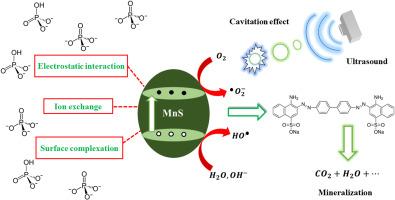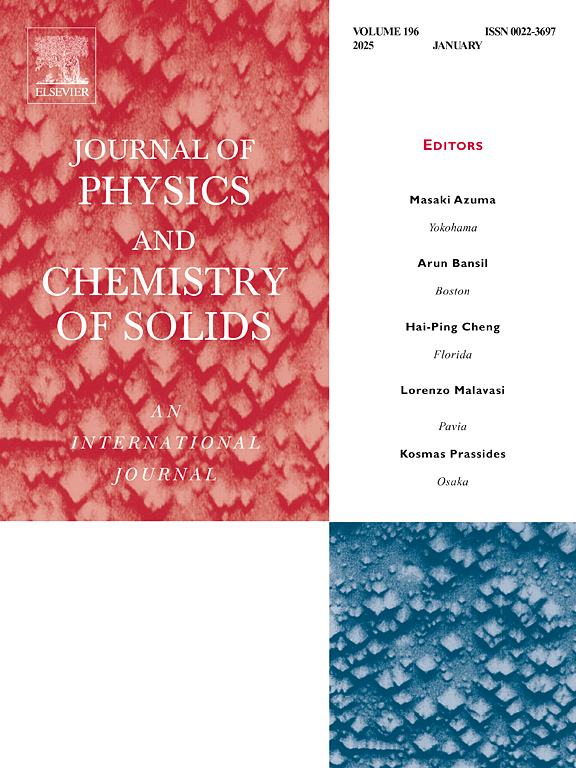Dual-functional MnS nanomaterials: Efficient adsorbent for phosphate removal and sonocatalyst for textile dye degradation
IF 4.3
3区 材料科学
Q2 CHEMISTRY, MULTIDISCIPLINARY
引用次数: 0
Abstract
Naturally abundant, environmentally friendly alternatives for replacing the expensive lanthanum-based phosphate removal technique are sought after. Solocatalysis is an emerging area for water remediation. This study introduces a dual-functional MnS nanomaterial for removing phosphate ions and Congo Red textile dye. MnS nanomaterials were synthesized via a hydrothermal route. Batch adsorption experiments revealed a phosphate adsorption capacity of 160.73 mg P/g, commendable for adsorbent in its bare form. Thermodynamic parameters of the process indicated a spontaneous, exothermic process, confirming favourable adsorption. FTIR analysis confirmed the adsorption mechanism, which includes electrostatic attraction, surface complexation, and ion exchange. MnS maintained its adsorption capacity despite competing ions, demonstrating a selective affinity for phosphate ions. MnS showed high sonocatalytic efficiency, degrading Congo Red dye within 10 min of ultrasonic irradiation. The degradation mechanism of Congo Red dye in the sonocatalytic process is proposed. This novel metal chalcogenide material exhibits exceptional affinity for phosphate ions and Congo Red dye molecules, surpassing La-based adsorbents in efficacy. The results suggest that MnS nanomaterials are promising for practical applications in phosphate removal and textile dye degradation from wastewater.

双功能 MnS 纳米材料:去除磷酸盐的高效吸附剂和降解纺织染料的声催化剂
人们正在寻找天然丰富的环保型替代品,以取代昂贵的镧系磷酸盐去除技术。溶解催化是一个新兴的水修复领域。本研究介绍了一种用于去除磷酸盐离子和刚果红纺织染料的双功能 MnS 纳米材料。MnS 纳米材料是通过水热法合成的。批量吸附实验显示其磷酸盐吸附容量为 160.73 mg P/g,这对于裸吸附剂来说是值得称赞的。吸附过程的热力学参数表明这是一个自发的放热过程,证实了吸附效果良好。傅立叶变换红外分析证实了吸附机理,包括静电吸引、表面络合和离子交换。尽管存在竞争离子,MnS 仍能保持其吸附能力,这表明它对磷酸离子具有选择性亲和力。MnS 具有很高的超声催化效率,能在超声波照射 10 分钟内降解刚果红染料。提出了在声催化过程中刚果红染料的降解机理。这种新型金属卤化物材料对磷酸根离子和刚果红染料分子具有超强的亲和力,在功效上超过了镭基吸附剂。研究结果表明,MnS 纳米材料在去除废水中的磷酸盐和降解纺织染料方面具有良好的实际应用前景。
本文章由计算机程序翻译,如有差异,请以英文原文为准。
求助全文
约1分钟内获得全文
求助全文
来源期刊
CiteScore
7.80
自引率
2.50%
发文量
605
审稿时长
40 days
期刊介绍:
The Journal of Physics and Chemistry of Solids is a well-established international medium for publication of archival research in condensed matter and materials sciences. Areas of interest broadly include experimental and theoretical research on electronic, magnetic, spectroscopic and structural properties as well as the statistical mechanics and thermodynamics of materials. The focus is on gaining physical and chemical insight into the properties and potential applications of condensed matter systems.
Within the broad scope of the journal, beyond regular contributions, the editors have identified submissions in the following areas of physics and chemistry of solids to be of special current interest to the journal:
Low-dimensional systems
Exotic states of quantum electron matter including topological phases
Energy conversion and storage
Interfaces, nanoparticles and catalysts.

 求助内容:
求助内容: 应助结果提醒方式:
应助结果提醒方式:


